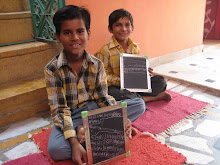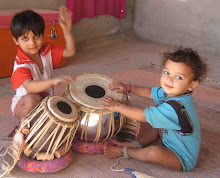
One hot, dusty summer night, I went out for a walk with a small woman who was the mother of a Merasi School student. She wanted to buy milk, but, knowing it wasn't safe for someone of her caste to be out alone in the evening, asked me to come along.
As we walked, our talk traipsed easily across stories about our fathers, how to make a perfect cup of chai and what kind of cheese Americans use on pizza. It was a conversation that felt like it could have happened at a sidewalk cafe in New York City or in front of a bathroom mirror on a break from dinner with friends.
We arrived at the little wooden booth and purchased a small plastic sack of milk for the morning's chai. I cupped the bag in my hand and walked alongside the woman. As we turned the corner, she leaned against my arm and indicated a dilapidated old house in front of us.
"I used to beg there," she said quietly. I started at the rundown heap of bricks and mortar that stood flimsily just off the street.
"That's why I send my children to school," she said, walking on. "They shouldn't have that. Their life is more than that. I know this."
And she's right. Their life is more than that. And so is hers. We cannot heal the wounds of the past, but we can fight fiercely to ensure that they are not replicated in the future. This generation of Merasi children will have new fights to fight, of this, I am sure. But with every class that's taught, every mind that's engaged, we move further away from the reality of the past and closer towards the possibility of the future.










